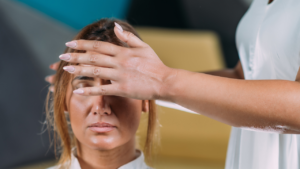Watching your spouse or partner struggle with addiction is emotionally draining — and triggering. Maybe you have been building resentment toward them because of their substance abuse and it has left you boiling inside with frustration. Maybe their addiction-fueled actions have left your marriage hanging by a thread. If you’re ready to give up, just know that there is still hope for your relationship! Here’s how a residential treatment facility, or “rehab” can save your marriage.
Saving Your Marriage with Rehab
It’s often a partner or other loved one that suggests rehab for an addict or alcoholic in the first place. Sometimes, it can be hard for someone in the grips of addiction to have the perspective to know that they need help.
For the “normie” in the equation, it can be hard to summon the hope that getting help might actually work. It’s likely that your partner has told you time and time again that they can and will stop — only to fail and leave you disappointed yet again. What you need to understand is that addiction is a disease. Just like any disease, it needs to be treated professionally. If your partner has struggled to stop, it’s not because they don’t want to, or because they are weak. It’s because they are sick. If your partner had cancer, you wouldn’t just tell them to get better and expect them to do it without treatment, right?
This is why residential addiction treatment is almost always necessary to treat alcohol or drug addiction. At Transformations Care, we not only can help your loved one overcome their addiction; but also, we’ll get down to the root of the underlying mental health issues that are fueling your loved one’s substance abuse. Our goal is to return your spouse or partner back to you, so the two of you can live a better life together.
Finding Hope for Addiction Recovery
We understand that you may be frustrated and at your last straw with your relationship. The truth is that unlike you, a “normie,” your partner ‘s addict mind turns them into a completely different person when they use. It’s not really them who is breaking your heart. It’s the brain disease that they have.
Just remember that no matter how bad it seems, there is still hope to save your marriage, and to make your relationship stronger than ever. It will take work from both you and your partner, but if you’re determined, you both will get through this difficult time and put it all behind you. This all depends on your partner going to residential treatment.
At Transformations Care, we provide group and individualized therapy to give your loved one the tools they need to live out a life in recovery. We understand that there’s no single path to recovery, so we will work with your partner to find their best way. We’ll also help find sobriety group support meetings after treatment as well, so they can continue to put work into their recovery and your relationship. And, if you’re interested in getting help for yourself, we can recommend 12 Step groups that could give you the support you need.
How To Help Your Addicted Spouse
Speaking of your role, you can play a part in the success of saving your marriage, too! It’s not all on your partner. You can support them and their recovery by encouraging your spouse to get treatment, positively reinforcing them, and doing what you can to help their recovery. In addition, you can work to make your home a recovery-friendly environment for when they return from rehab. For example: getting rid of all alcohol and drugs in the house. For more ways to create a recovery friendly environment for your spouse, check out our blog post or even call one of our caring staff members! At Transformations Care, we are more than happy to answer any questions you may have as well as provide you with Al-Anon resources.
You also need to “clean up your side of the street,” as we say in recovery. Al-Anon is a support group meeting that loved ones of alcoholics or addicts attend. It can act as an outlet for you, while giving you support and advice on how to help your marriage and yourself. Attending Al-Anon meetings is another way you can not only reinforce your relationship, but help yourself get the support you need too. If Al-Anon itself doesn’t feel like a good fit, there are alternatives and we are more than happy to provide you with the info you need to choose the right support group for yourself. The best part is, you can easily attend in the comfort of your own home because many of these family support groups have Zoom or phone meetings!
Approaching Your Partner About Addiction
It can be difficult for you to bring up your partner’s addiction to them, but if you’re going to do it, it’s important that you approach them in a calm and helpful manner. Don’t bring up the topic when you’re riding high on anger and resentment, fresh off of another disappointment. Approach the situation delicately, and avoid using ultimatums. We understand you may be frustrated and feel you’re at the very last straw with your partner’s addiction, but using ultimatums like, “Stop drinking or I’ll divorce you,” can be extremely harsh and only cause hurt and resentment in the end. If you really feel that way, then be ready to back up your ultimatum with action.
Remember, though, that addiction is a disease. Your partner isn’t intentionally hurting you through their addiction.
A helpful tip when approaching your partner is to present an addiction treatment facility, like Transformations Care, to show them a solution right off the bat. That will help them to see a way forward, as opposed to just feeling trapped because you’re just aggressively complaining about their using or drinking again. For more information on do’s and don’ts for approaching your loved one about residential addiction treatment, click here.
Residential Addiction Treatment
Having a spouse that struggles with addiction can cause a buildup of emotional pain and resentment, but residential addiction treatment does have the potential to save your relationship or marriage. Finding the right rehab is very important to not only help your partner get sober, but to help them stay sober. At Transformations Care, we will give your partner the tools they need to handle their struggle with addiction, and how to use those tools to better deal with life and relationship issues when they arise.
It isn’t as black and white as “getting sober = a perfect relationship” when they come home, though. Once your partner is clean and sober, they’ll still have the underlying issues that may have fueled the addiction in the first place. Nothing happens till you’re clean and sober, but once you’re clean and sober, the healing continues.
At Transformations Care, we believe in a dual diagnosis approach to treat the underlying mental health issues as well as the addiction. Through group and individual therapy, we will teach your partner communication skills and alternative coping mechanisms to work through issues, rather than turning back to their dependency of a substance.
At Transformations Care, once your loved one is here with us, we consider them — and you — a part of our family. Reach out to us with any questions you may have! Don’t wait until your loved one’s addiction leads them to a place that they can’t come back from. We are more than happy to answer any questions you have, from approaching your loved one about treatment to ways you can help your spouse’s recovery. We’re always here. Call us at 424.339.0965 today.



















